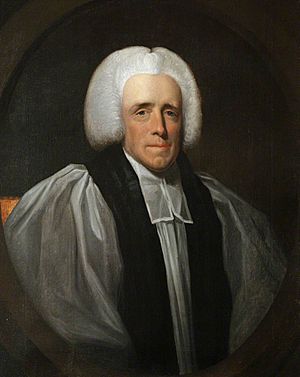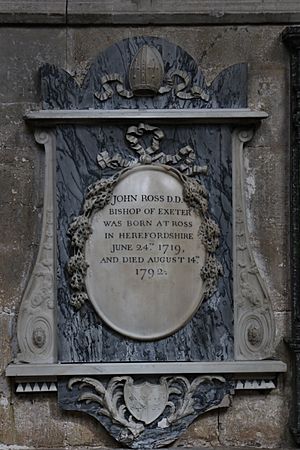John Ross (bishop of Exeter) facts for kids


John Ross (sometimes spelled Rosse) was an important English church leader who lived from 1719 to 1792. He became the Bishop of Exeter, a high-ranking position in the Church of England.
Contents
Early Life and Education
John Ross was born in a town called Ross-on-Wye in Herefordshire, England. His birthday was either June 24 or 25, 1719. He was the only son of John Rosse, who was a lawyer in the town.
John went to the Hereford Cathedral School for his early education. After that, he went to St John's College, Cambridge in April 1737. He was a very good student and earned several degrees: a Bachelor of Arts (B.A.) in 1741, a Master of Arts (M.A.) in 1744, a Bachelor of Divinity (B.D.) in 1751, and a Doctor of Divinity (D.D.) in 1756. He also spent time at Oxford University. From 1744 to 1770, he was a fellow at St. John's, which meant he was a senior member of the college, involved in teaching and research.
Career as a Church Leader
In 1757, John Ross was chosen to be a preacher at the Rolls Chapel in London. In the same year, he also became a chaplain to the King. This was a significant role, advising the monarch on religious matters. He was also elected as a Fellow of the Royal Society in 1758, which shows he was respected in the scientific community too.
A former student of his, Lord Weymouth, helped him get the job as the vicar of Frome, a town in Somerset, in 1760. John Ross kept this position for the rest of his life. In 1769, he also became a canon at Durham Cathedral.
Becoming Bishop of Exeter
On January 25, 1778, John Ross reached a very high position when he was consecrated as the Bishop of Exeter. As bishop, he was in charge of the churches and clergy in the Diocese of Exeter. Along with being bishop, he also held other important roles in the church, such as the archdeaconry of Exeter and a prebendal stall (another type of church position) in the cathedral. He also became the rector of Shobrooke in Devon. He gave up his role at Durham Cathedral but continued to be the vicar of Frome.
Views and Interactions
Bishop Ross had some interesting views for his time. He wasn't in favor of the new idea of Sunday schools, which were just starting to become popular. However, he believed in greater religious freedom for dissenters, who were Protestants who did not belong to the Church of England. He spoke about this in a sermon to the House of Lords in 1779.
He also had a friendly meeting with John Wesley, a famous leader of the Methodist movement. Wesley visited Exeter Cathedral in 1772 and enjoyed the service. Bishop Ross then invited Wesley to dinner, which Wesley also found pleasant.
Later Life and Legacy
Towards the end of his life, Bishop Ross's health declined. He passed away at the bishop's palace in Exeter on August 14, 1792. He was buried in Exeter Cathedral. He left most of his money to a distant relative named Eliza Maria Garway.
Works and Contributions
Besides his church duties, John Ross was also involved in academic work. In 1749, he edited letters written by the famous Roman orator Cicero. He also wrote a humorous essay in response to another scholar's work on Cicero. He wrote several sermons, which are religious speeches, and helped revise a book called English Orator by Richard Polwhele. He was also a supporter of the antiquarian George Ashby.
 | George Robert Carruthers |
 | Patricia Bath |
 | Jan Ernst Matzeliger |
 | Alexander Miles |

